Registered dietitians have been personalizing nutrition plans for decades. We all eat differently and have unique health needs and goals. As a nutritionist, I find that people have an easier time following a customized plan since it takes their food preferences, lifestyle, cooking skills, health, goals, and everything else that affects how, why, and what we eat into consideration.
Gainful is a supplement company offering expert-formulated supplements customized to meet individual goals and lifestyles. Gainful’s customized protein powder gives you the ability to build your own protein supplement based on your preferred foods, lifestyle, and goals. Gainful says their customized protein powder gives your body what it needs to “prepare, perform, and recover.”
We wanted to take a closer look at Gainful Customized Protein, including the customization options, ingredients, effectiveness, safety, and price to see how it stacks up to the claims and how it might work for you.
Medical disclaimer: This article is intended for educational and informational purposes only. It is not intended as a substitute for medical advice. For health advice, contact a licensed healthcare provider.
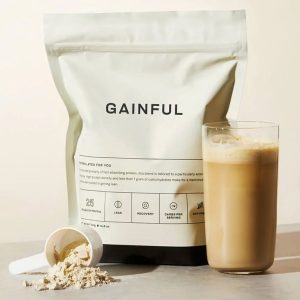

Key product features
What you should know
Gainful Customized Protein is customized to match your nutrition preferences and health goals. They offer four protein base options and three health goals so you get a supplement that fits your personal needs.
- Gainful protein powder is purposely unflavored, so you can use one of their eight single-serving flavor boosters and have a different shake every day.
- Customization of your protein powder comes at a higher price, costing $3.50 per serving, about $2 more than the average protein powder on the market.
- We think Gainful Protein Powder makes a great choice for individuals who get bored drinking the same flavor protein shake day after day, but don’t want to buy or store multiple protein powders.
- With your Gainful subscription, you have free access to a registered dietitian who can answer your nutrition and fitness questions and explain how to utilize your protein powder to reach your goals.
- Gainful Protein Powder only has 14 servings per bag, and you may need more than one bag a month if you use protein powder daily.
Gainful Customized Protein overview
We’ve featured Gainful Protein Powder in many of our reviews. We like that Gainful gives you some control over your own protein powder, especially flavor. Nothing is more disappointing than having a big tub of protein powder you can’t use because you don’t like the taste. Gainful comes unflavored, but offers individual flavor boost packets so you can have a new shake every day.
For this review, we took a closer look at Gainful’s customized protein powder and how it works, what you get, and whether it’s worth the price.
Specs
| Price per serving | $3.50 |
| Servings per container | 14 |
| Protein per serving | 19-25 g |
| Carbs per serving | 1-9 g |
| Fat per serving | 0-6 g |
| Calories per serving | 110-140 |
| Flavors | Strawberry cream, sea salt caramel, rich cocoa, Madagascar vanilla, cinnamon toast, cookies and cream, chocolate peanut butter, caffe mocha |
How Gainful customization works
You can take the quiz on the Gainful website or app to get your customized plan and supplement recommendations, or select the protein base and goal boost yourself. The quiz includes questions about your nutrition and health goals, nutrition knowledge and eating habits, exercise routine, age, weight and height, weight goals, and sleep pattern.
Gainful uses the answers from your quiz to generate a list of supplement recommendations, which may include their pre-workout supplement, daily performance greens, and hydration formula, as well as your customized protein powder.
According to Gainful, each supplement recommendation is personalized to match your goals and needs. However, it may not be as personalized as it appears.
For example, Gainful recommended the moderate intensity hydration formula for my low-intensity, nonsweaty workout. When I compared the nutrition facts of the moderate sweat hydration formula to the heavy sweat formula, I noticed both contained the same type and amount of electrolytes. There was no difference in the hydration formula when adjusted for sweat level.
Despite promoting themselves as the brand with “expert-formulated supplements customized to your unique body, lifestyle, and goals,” the products recommended after you take the quiz may not be as customized as you’re led to believe. This is true even for the customized protein powder, despite making it appear as though Gainful customizes your protein base to match your goal boost. Essentially, Gainful’s protein powder formulas and macro amounts vary by protein base (whey, vegan, low lactose, keto blends) and are not further customizable by goal boost, though selecting a certain goal boost may change the protein base selection.
Protein base options
Gainful offers four protein base choices for their customized protein powder. The type of protein base the recommend following your quiz depends on your diet preferences and goals.
Gainful’s protein bases include:
Whey protein powder
The whey protein powder is a standard whey supplement, containing whey protein isolate and whey protein concentrate. The whey protein packs in the most protein than any other base option, providing 25 grams per serving.
Whey protein is one of the most popular protein powders among athletes and bodybuilders because it contains the ideal amino acid profile for muscle building, including the branched-chain amino acids (BCAAs) that stimulate muscle protein synthesis. (1) The body also digests and utilizes whey protein quickly, leading to better results than other high-quality proteins like casein and soy. (1)
Whey protein isolate is processed more than whey protein concentrate, so it has a higher concentration of protein with fewer carbs and fat. (2) Gainful’s whey protein base is the lowest in fat and carbs, with 1 gram of each, and has only 110 calories.
The whey protein powder also has green tea extract, which is a source of caffeine that may boost energy for workouts and support weight loss. (3, 4) The amount of caffeine in the protein supplement isn’t provided, but you may want to consume this protein shake earlier in the day so it doesn’t affect your sleep if you are more sensitive to caffeine. Green tea contains a substance called L-theanine that counteracts some of the stimulating effects of caffeine. (4)
“L-theanine has also been shown to also help with mental recovery, which can be beneficial after a hard workout session.”
Victoria Burgess, PhD, CSCS, CISSN
The whey protein powder also meets 10% of the daily value for calcium and provides small amounts of potassium, phosphorus, magnesium, copper, and manganese.
Nutrition facts per scoop:
- 110 calories
- 1 gram of fat
- 1 gram of carbs
- 25 grams of protein
Plant-based protein base
Gainful’s plant-based protein powder uses a protein blend consisting of organic pea protein and organic brown rice protein. The vegan protein powder from Gainful provides 20 grams of protein per scoop.
Though pea protein is a complete protein with all of the essential amino acids, combining the two plant proteins improves the amino acid profile and protein digestibility-corrected amino acid score (PDCAAS) of the protein powder. (5)
Researchers use PDCAAS to evaluate protein quality. A PDCAAS of 1.0 means the protein provides 100% or more of all the essential amino acids. Eggs, whey, and soy have 1.0 PDCAAS, while pea protein’s PDCAAS ranges from 0.64 to 0.82. (5, 6) Combining pea protein with brown rice protein creates a protein powder with a 1.0 PDCAAS. (5)
The plant-based protein also has organic tapioca maltodextrin and organic gluten-free oat powder, serving as a source of carbohydrates to support post-workout recovery. (7) This protein base has the highest carb content, providing 9 grams per scoop. But it has only 1 gram of fat and 120 calories.
Gainful’s vegan protein powder also meets 15% of the daily value for iron and phosphorus and 10% of the daily value for vitamin E. You also get small amounts of calcium and manganese.
Nutrition facts per scoop:
- 120 calories
- 1 gram of fat
- 9 grams of carbs
- 1 gram of fiber
- 20 grams of protein
Low-lactose whey protein base
The low-lactose whey protein base from Gainful contains ultra-filtered whey protein isolate and fast-absorbing carbs in the form of organic tapioca maltodextrin for post-workout recovery. (7) This formula supports muscle building and weight gain when combined with strength training, packing in 23 grams of high-quality protein, 4 grams of carbs without fat, and only 110 calories per serving.
Some people may avoid whey protein powder because it causes bloating or gas, symptoms from the lactose in the supplement, which is a carbohydrate in cow’s milk that some people have a hard time digesting. (8)
The low-lactose whey protein base is designed to minimize discomfort and maximize nutrition and is 98% lactose-free. It also provides small amounts of vitamin D, calcium, and magnesium,
Nutrition facts per scoop:
- 110 calories
- Zero fat
- 4 grams of carbs
- 23 grams of protein
Ketogenic protein base
Whey protein isolate also serves as the primary protein in Gainful’s ketogenic formula base. The ketogenic diet is a high-fat, low-carb diet that forces the body to use fat in the form of ketones for energy instead of glucose. (9) It’s popular for weight loss because it burns excess body fat and helps control hunger better than low-fat diets. (9)
However, you also need to get an adequate amount of protein when following a keto diet to minimize muscle loss. (9) How much protein you need on a keto diet depends on your activity. Using a protein powder designed for the ketogenic diet can supply the protein you need without kicking you out of ketosis.
The ketogenic protein powder provides 19 grams of protein, 3 grams of carbs, 6 grams of fat, and 140 calories.
This formula uses medium-chain triglyceride (MCT) oil powder as a source of fat, supplying nearly 40% of the calories in each scoop of the protein powder. MCT oil makes it easier for you to reach and stay in ketosis, supporting your health goals. (10)
We do want to point out that Gainful’s ketogenic protein powder has 6 grams of saturated fat, meeting 31% of the daily value, from the MCT oil powder. High intakes of saturated fat increases the risk of high cholesterol and heart disease. The dietary guidelines recommend limiting intake to less than 10% of calories, or no more than 20 grams of saturated fat a day on a 2,000-calorie diet. (11)
However, a 2021 review study published in The Journal of Nutrition concluded that MCT oil doesn’t negatively affect cholesterol like long-chain triglyceride (LCT) saturated fat found in fatty red meat and butter, but may raise triglyceride levels. (12) If you have high cholesterol or concerns about cholesterol and heart health, talk to your doctor or a registered dietitian before adding a supplement with MCT oil to find out if it’s safe for you.
The ketogenic protein powder also supplies small amounts of vitamin D, calcium, potassium, phosphorus, and manganese.
Nutrition facts per scoop:
- 140 calories
- 6 grams of fat
- 6 grams of saturated fat
- 3 grams of carbs
- 19 grams of protein
Goal boosts
Gainful protein powders may further customize your supplement based on your health goal. They offer three goal boosts:
Build muscle
To build muscle, Gainful recommends a protein base with a higher protein density. Their traditional whey protein powder has the highest amount of protein, providing 25 grams per scoop. For people who need to avoid dairy products, the plant-based protein powder has 20 grams of protein.
For muscle growth, the International Society of Sports Nutrition (ISSN) recommends consuming 20 to 40 grams of high-quality protein at regular intervals throughout the day. (1) So, both the plant and whey protein powders supply the protein necessary to build muscle. “In addition, consuming around 20-25g within an hour post workout will optimize muscle protein synthesis,” explains Victoria Burgess, PhD, CSCS, CISSN.
Lose weight
According to Gainful’s website, the lose weight goal boost is formulated to support your metabolism and weight loss with protein powders higher in protein and lower in carbohydrates. The whey protein powder seems to best fit this description, providing 25 grams of protein and 1 gram of carbohydrates.
The whey protein base also has green tea extract to support metabolism. It’s theorized that the caffeine and catechins in green tea help with weight loss by increasing metabolism and fat burning. (4) Though studies show that green tea may provide some help with weight loss, don’t expect dramatic results. (13) Eating a balanced diet, getting regular exercise, managing stress, and getting enough sleep is essential for getting to a healthy weight. Adding green tea may support your efforts, but you still need to create healthy habits to make it work.
Getting more protein in your diet may offer more help with weight loss than green tea extract. Higher protein diets support weight management by boosting metabolism, keeping you full, and preserving muscle while you lose fat. (14) “Protein has a higher thermogenic effect than fat and carbohydrates,” added Burgess, “meaning the body heats up more as it digests protein, thus burning more total calories during the digestion process.”
The low-lactose whey and plant protein from Gainful are higher in carbs, but supply an adequate amount of protein and about the same calories as the whey protein—110 calories in the low-lactose formula and 120 formula in the plant protein. If you need to avoid whey or dairy, these protein powders can help you with your weight loss goal too.
The ketogenic formula can also support a weight loss goal for people following a keto diet.
When using a protein powder to help with weight loss, make sure to include it as part of your balanced diet. Getting more calories than you need, even from a protein powder designed for weight loss may lead to weight gain. “Making sure to include the protein powder in your total calories to ensure a calorie deficit is most important for weight loss,” adds Burgess.
Gain weight
The gain weight booster is formulated to provide more carbs. Gainful may recommend the low-lactose whey protein, which has 4 grams of carbs and 110 calories, or the plant-based protein powder with 9 grams of carbs and 120 calories.
Weight gain can be as difficult as weight loss for some. To gain healthy weight, you need to follow a balanced diet that emphasizes energy-dense, nutrient-rich foods. (15) Eating junk food to gain weight may provide extra calories, but not the nutrition to support health.
Supplementing with a good protein shake is an easy way to boost calories and nutrition to support goals, especially for those with very high calorie needs or a poor appetite. (15)
Insight into Gainful goal boosts
Nutrition information for the different protein powders doesn’t change based on your goal boost. So, while Gainful may recommend a low-carb protein base for weight loss, they may recommend the plant-based powder if you follow a vegan diet. Dietary preferences take precedence over health goals.
You have access to a registered dietitian through your Gainful subscription, they can provide personalized guidance on how best to use the recommended protein base powder to meet your goals.
Flavor boosts
The flavor packets really make Gainful protein powder standout from other protein supplements, giving you full control over the type and degree of flavor in your protein shake.
Gainful offers eight flavor options: strawberry cream, sea salt caramel, rich cocoa, Madagascar vanilla, cinnamon toast, cookies and cream, chocolate peanut butter, and caffe mocha.
Each single-serving flavor packet contains a similar list of ingredients, including natural flavor, organic tapioca maltodextrin, organic stevia, guar gum, and monk fruit extract. The rich cocoa and caffe mocha have cocoa and the cinnamon toast has cinnamon. But none of the flavor boosts have artificial flavors, colors, or sweeteners.
Nutrition information varies a little by flavor, adding 6 to 10 calories and 1-2 grams of carbs to your protein shake.
When purchasing your Gainful protein powder you can select two flavors with your order, seven servings of each flavor. They also have a variety pack so you can try all of the flavors to see which one you like best.
Our testers really enjoyed Gainful’s flavor boosters. They liked trying different flavors without having to commit to a large container of a flavor they may not like. Our testers also got creative, mixing flavors to make their own tasty protein shake.
Third-party testing, certifications, and allergens
It’s not clear on the Gainful Customized Protein webpage if their products are third-party tested for quality. Our team of nutrition and fitness reviewers uses third-party testing as a tool to evaluate a supplement’s safety, ensuring it contains the ingredients listed on the label.
In the Help Center section of their website, Gainful says that all of the ingredients they use in their protein powders have certificates of analysis (COA), the results of the independent lab test. Further, they manufacture their supplements in FDA-compliant, Good Manufacturing Practices (GMP) certified facilities.
Supplement makers aren’t required to do third-party testing, but the FDA requires that they make their products following GMP. (16) Individual ingredients used in the Gainful protein powders are tested, but not the protein powder itself, making it difficult to assess the quality of the protein powder and that it contains the ingredients listed on the label.
Gainful protein powders have no special certifications, but all products are free of genetically modified organisms (GMOs) and many contain organic ingredients.
Though none of Gainful’s products contain nuts, peanuts, fish, or shellfish, they’re manufactured in facilities that use these common food allergens. If you have severe food allergies, talk to your doctor about how to safely add supplements.
Taste and mixability
Taste is an important factor to consider when selecting a protein powder. You won’t reach your fitness goals if you’re unable to drink the shake aimed at supporting those goals.
Gainful is a winner in the taste department. Our testers loved the flavor boosts and using the variety pack to find their favorite flavor.
Directions say to shake the protein powder and flavor packet in a blender bottle with 8-12 ounces of cow’s milk, a plant milk such as almond milk, or water for 30 seconds. Some of our testers said the powder didn’t mix well and was a bit clumpy. You may need to shake harder or use a blender to mix if you want to improve the texture of your shake.
Price
Gainful customized protein powder has a lot of good qualities. It’s made with quality ingredients, offers multiple protein options, and helps you find the protein powder that aligns with your goals. However, all the perks come at a high cost.
At $3.50 per serving, Gainful Protein Powder is much higher than the average market price for protein powders, which ranges from $0.50 to $2 a serving. And, the bag of protein powder has only 14 servings, so you may need at least two bags a month if you drink a protein shake every day.
But, you can save when buying multiple bags at a time. For two bags, the price drops to $2.57 a serving and for three bags $2.54 a serving. A subscription also lowers the cost per serving to $3.21 for one bag, $2.36 for two bags, and $2.34 for three bags.
With a subscription, Gainful automatically sends out your next shipment every 3, 4, 6, or 8 weeks (you choose the frequency). You can delay, skip, or cancel your shipment anytime. They also offer a 30-day money-back guarantee.
Bottom line
Gainful promotes itself as a wellness company with products formulated just for you. They say all of their Gainful products are personally made by their on-staff registered dietitians so you get the supplements that suit your unique needs and goals.
While they do offer some customizations, I don’t think it’s quite as personalized as they say. The customized protein powder they recommend is based more on your diet preferences than health goals. Nutrition information for the protein powders doesn’t change when adjusting a goal boost.
Gainful says their lose weight goal boost is lower in carbs and higher in protein. But if you need to avoid dairy and want to lose weight, they recommend the plant-based protein which has the most carbs and less protein than the whey protein powders.
Your protein powder is customized, but not personalized based on your unique needs and goals. The majority of the customization is within the flavors and the type of protein being used.
What customers are saying
Gainful protein powder is available for purchase on Amazon, though most reviews are from Vine Customers, an Amazon program that sends out free items to select people who provide honest and helpful reviews. So far, reviews are favorable, with an average rating of 4.1 out of 5 from 78 customers.
Many reviewers of the Gainful protein powders on Amazon like the ingredients and concept of the customized protein powder, especially the ability to regularly change flavors. However, not everyone likes the taste or texture of the protein powder and some think the price was too high.
Freija L. is an Amazon Vine Customer who received the plant-based protein powder for muscle building. They liked the ingredients, taste, and wide range of flavor options. “This powder is made from very high quality ingredients, and that is reflected in the taste! There is a hint of pea and oat in the main powder, a sort of earthy flavor that was actually really good.”
Amazon Vine Customer John W. was initially concerned about the price of the whey protein powder to build muscle with only 14 servings per bag, but was pleased that the shipment came with two bags, providing 28 servings. Other than that, John liked the taste and found the shake easy to mix.
“The whey protein blended very easily and the shake was delicious as expected…I like the whey protein’s packaging in two resealable bags, which will take up no more space in my pantry than needed. But I do worry about misplacing the little flavor sticks.”
John W., Amazon
Bryon is a Vine Customer who was excited to try Gainful’s protein powder, but received too many packets of their least favorite flavor (chocolate) and not the flavors they expected. Bryon also thought the price for the protein powder was too high.
“What I received is 2 boxes of chocolate, 1 strawberry and 1 variety. $65 for this is pretty high especially not to get what is advertised. Most of the time I usually spend between $30-40 on my powder. Although the concept is great, it is not worth twice the price even if you are getting the right flavors,” Bryon wrote.
Compare Gainful protein formulas
| Formula | Protein source | Protein per serving | Calories per serving | Best for |
| Whey protein | Whey protein isolate, whey protein concentrate | 25 g | 110 | Lose weight, build muscle, gain weight |
| Plant/vegan | Organic pea protein, organic brown rice protein | 20 g | 120 | Lose weight, build muscle, gain weight |
| Low-lactose whey | Whey protein isolate | 23 g | 110 | Build muscle, lose weight |
| Ketogenic | Whey protein isolate | 19 g | 140 | Lose weight |
We’ve featured Gainful Customized Protein in:
Compare Gainful with other protein powders
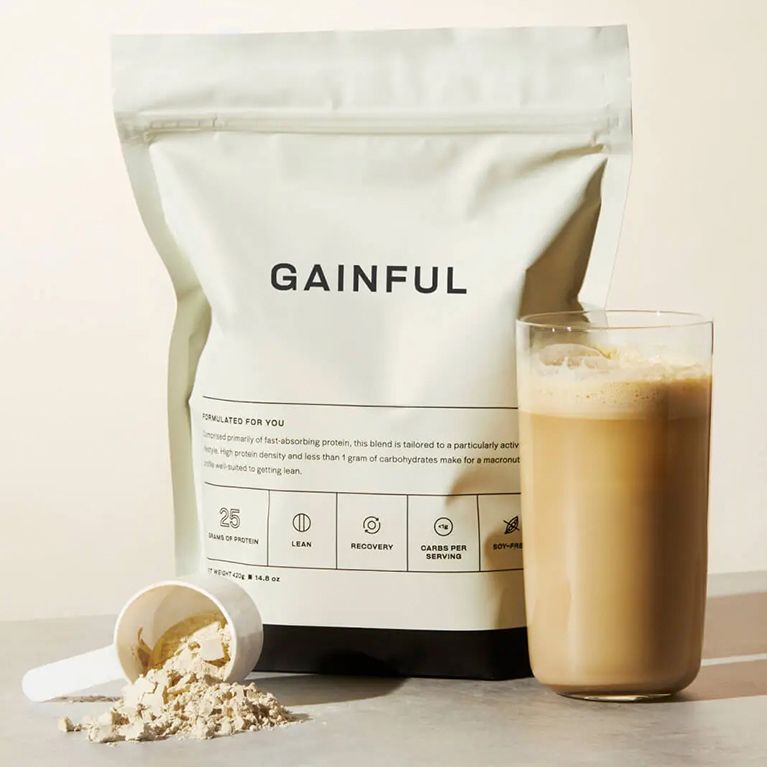
|
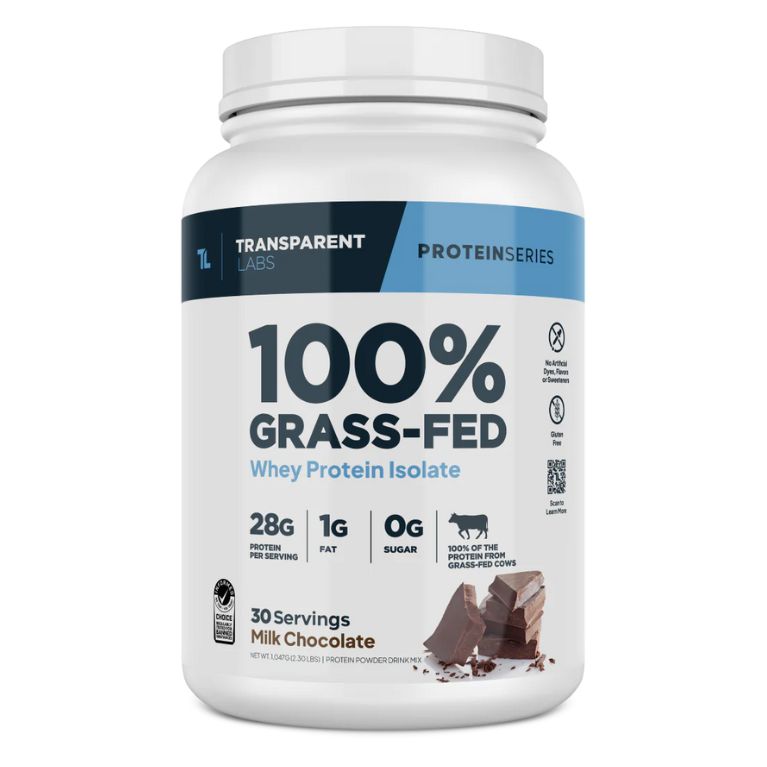
|
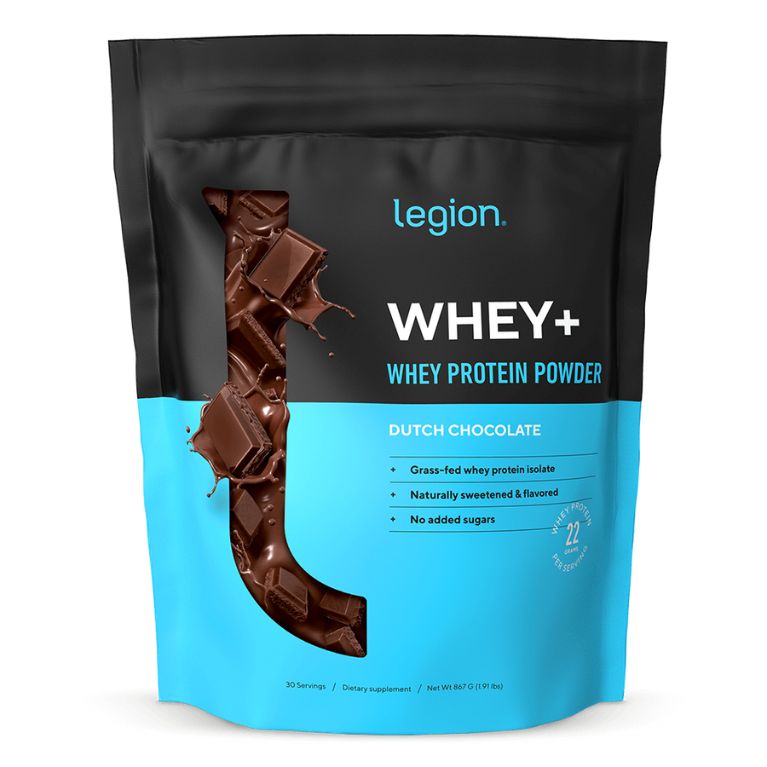
|
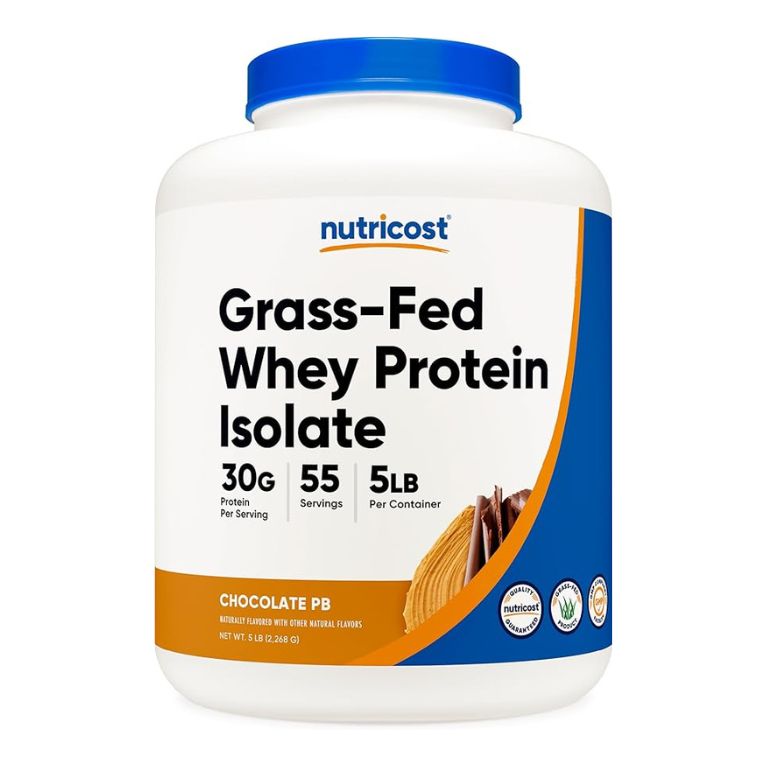
|
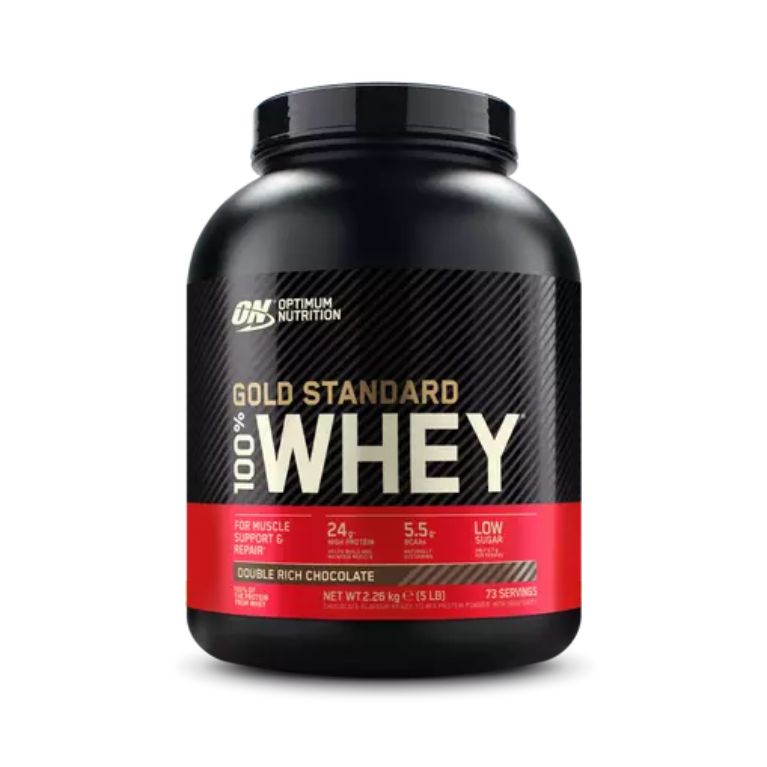
|
|
| Gainful Customized Protein Powder | Transparent Labs Whey Protein Isolate | Legion Athletics Whey+ | Nutricost Grass-Fed Whey Protein Isolate | Optimum Nutrition Gold Standard 100% Whey | |
| Rating | |||||
| Cost per serving | $3.50 | $2 | $2 | $1.45 | $1.55 |
| Protein source | Whey protein isolate, whey protein concentrate, or organic pea protein and organic brown rice protein | Grass-fed whey protein isolate | Whey protein isolate | Grass-fed whey protein isolate | Whey protein isolate, whey protein concentrate, hydrolyzed whey protein |
| Protein per serving | 19-25g | 28g | 21-23g | 30g | 24g |
| Dosage | 1 scoop (30-32g) | 1 scoop (34.9g) | 1 scoop (28.9g) | 1 scoop (40g) | 1 scoop (30.4g) |
How we test whey protein supplements
Whey protein is one of the most popular, widely-used forms of protein in dietary supplements. However, with so many whey protein options available, choosing the right one can be a challenge.
To identify the top whey protein products on the market, our team developed a detailed testing methodology and scoring algorithm to pinpoint the best of the best. This methodology covers six primary categories: protein source, macronutrient calories per serving, protein per serving, price per gram of protein, sweeteners, and third-party testing. Products can also earn bonus credits. These categories were developed in collaboration with registered dietitian and doctor of exercise physiology, Chris Mohr.
You can read our full whey protein testing methodology here.
Protein source–50%
The primary source of protein in a whey protein powder formula impacts its digestibility, absorption, and the ratio of protein to other macronutrients. We evaluate four different whey protein sources: whey concentrate, whey isolate, whey hydrolysate, and whey blends.
Total protein per serving–20%
This aspect of our rubric is based on research suggesting an optimal intake of 25–30 grams of protein per serving.
Macronutrient calories per serving–15%
The majority of calories in whey protein powders should come from protein, but depending on the ingredients, calories may also come from carbohydrates and fats.
Cost per serving–5%
Price often reflects quality, but not always. We rate whey protein powders based on their price per gram of protein
Sweeteners–10%
Sweeteners can enhance the taste of whey protein, but they don’t add any nutritional value. We prefer minimal sweeteners and rate them according to their nutritional profile.
Certifications
Testing certifications show whether a dietary supplement contains what the brand says it contains in the doses advertised. Certifications provide a small boost to the product’s overall score.
Here are the certifications that stand out to our team of experts:
- Third-party testing
- Informed Choice (ICFS)
- NSF
- U.S. Pharmacopeia (USP)
- Labdoor
Bonus points
To recognize innovation and encourage healthy competition, we incorporate bonus credits into our scores. Bonus points provide a small boost to the product’s overall score and are equally weighted.
- Enzymes for digestion
- Sustainable packaging
- 100% grass-fed whey
- Certified organic
- No proprietary blends
How we test plant-based protein supplements
Plant protein is a popular alternative to whey protein in dietary supplements. It’s generally made from plant-based sources such as peas, soy, brown rice, and seeds. While not all plant protein sources are complete proteins, most plant protein blends include at least one complete protein source.
To determine which plant protein products stand above the rest, our team developed a custom testing methodology and scoring algorithm. We evaluate plant protein powders across six categories: protein source, completeness of the protein, macronutrient calories per serving, protein per serving, price per gram of protein, and sweeteners. These categories were also developed with Chris Mohr, Ph.D., RD.
You can read our full plant-based protein testing methodology here.
Protein source–40%
The protein sources in a plant protein powder determine whether it’s a complete protein source. Some plant sources are missing or limited in one or another amino acid, making them incomplete. The source(s)n also determine the calories from protein versus carbohydrates or fats. We evaluate eight plant protein sources: soy, pea, hemp, brown rice, lentil, chia, pumpkin seed, and blends.
Complete protein–20%
To be considered complete proteins, protein supplements have to consistently provide all nine essential amino acids. Complete proteins receive the highest marks.
Macronutrient calories per serving–15%
Ideally, most of the calories consumed through plant protein powder should come from protein. However, calories may also come from carbohydrates and fats.
Total protein per serving–15%
While daily protein needs vary by individual, based on age, gender, training, goals and the other parts of the diet, 25-30 grams per meal meets the needs of most people. Most plant protein supplements contain around 15-30 grams of protein per serving. However, the quality, types, and combination of plant proteins may determine the ideal quantity, meaning sometimes higher amounts may be beneficial, given the source.
Price per gram of protein–5%
Price is an important factor for consumers and often (though not always) reflects the quality of a product. Because of this potential discrepancy, this category carries less weight in the overall score.
Since protein content is the best measure of value for a plant protein powder, we rate each product based on the price per gram of protein.
Sweeteners–5%
Sweeteners may improve the taste profile of a plant-based protein supplement, but they don’t add nutritional value beyond sometimes being a fast-burning energy source. We prefer to see minimal sweeteners in plant protein formulas, and we prefer some over others.
Certifications
Nearly all reputable supplement companies conduct in-house testing for safety and label accuracy. However, many brands also opt for additional certifications to further ensure quality and safety. We award bonus credits to brands that undertake this additional step. Recognizing that smaller, newer supplement companies may not afford high-profile, third-party testing labs, we weigh certifications lower than other categories in our algorithm.
Bonus points
Since the supplement industry is constantly evolving, we pay attention to products and brands going above and beyond to stand out. All bonus points are equally weighted and cumulatively provide a slight boost to the product’s overall score.
Plant protein formulas are awarded bonus credits for the following:
- No proprietary blends
- Sustainable packaging
- Added enzymes
FAQs
Is Gainful protein good?
Gainful protein powder is a good supplement made with quality ingredients. They offer four protein bases to meet different health goals and dietary preferences. Gainful protein is purposefully unflavored, providing single-serving flavor boosts with eight flavors to choose from, allowing you to change the taste of your shake every day.
Is Gainful protein worth it?
Gainful protein is worth it if you like customizing your protein powder based on dietary needs and health goals, and want to vary the flavor of your protein drink from day-to-day. Gainful also offers free access to registered dietitians who can provide guidance on how to use your protein powder to reach goals.
But at $3.50 a serving, Gainful protein is one of the priciest protein powders on the market and may not work for all budgets.
Does Gainful help you gain weight?
Gainful’s customized protein offers a gain weight goal boost protein powder that’s higher in carbohydrates to help you add more pounds. However, the shake alone won’t help you gain weight unless it provides the extra calories you need to make your desired gains.
Healthy weight gain requires an increase in calorie intake following a balanced diet that includes high-calorie, nutrient-dense foods, such as avocados, nuts, seeds, dried fruit, beans, whole grains, lean meat, fish, poultry, eggs, and cheese. (15) Calorie needs for weight gain depend on activity level, health, and personal goals. Gainful protein may help, but may not provide enough additional calories and protein on its own if you’re trying to bulk up.
The higher carb protein powders from Gainful only have 110 to 120 calories and 4 to 9 grams of carbs per serving. By comparison, mass gainers are supplements designed for weight gain and bulking up, and may have 500 to 1,500 calories per serving and 50 grams of carbs or more. (17)
Is Gainful good for muscle gain?
Gainful customized protein powder uses high-quality protein sources—whey protein or pea and brown rice protein—that supply the amino acids needed for muscle gain. If you’re strength-training and unable to meet your daily protein needs with whole foods to make the gains you want, Gainful customized protein may help.
The supplement company has a number of other products to support muscle gain, including pre-workout, creatine monohydrate, and muscle recovery and performance boost supplements.
Is Gainful protein powder third-party tested?
It’s unclear if Gainful protein powders are third-party tested. However, based on information from the official website, it seems they don’t independently test the protein powders, but require testing for all ingredients used in the formula. Gainful also produces their protein powders in FDA-compliant facilities that follow GMP guidelines.
Our experts
Victoria Burgess, Ph.D., CSCS, CISSN
Victoria Burgess earned her Ph.D. in Health and Human Performance from Concordia University Chicago and holds her NSCA CSCS and Certified Sports Nutritionist (CISSN). She is an adjunct professor in the Human Performance and Nutrition department at Concordia University Chicago & Parker University, where she teaches undergraduate, graduate, and doctoral-level courses.
Pete Nastasi, CPT, CSNC
Pete Nastasi is a NASM-certified sports nutrition coach, personal trainer, and the owner of N2 Nutrition and Performance. Pete helps individual clients achieve their sports performance and weight-loss goals through a personalized approach centered around diet optimization, easy-to-follow workout routines, and healthy lifestyle habits.
Jessica Coulon
Jessica is a contributing editor and writer who specializes in fitness, health, nutrition, and science content. Previously, she was an editor for Popular Mechanics and Bicycling, where she covered pro cycling news, wrote how-to guides, and tested all the latest and greatest bike gear. She was also a regular shoe tester and contributor for Runner’s World. You can often find her skiing or riding her mountain bike, and racing with the F1RE female enduro team.
Lily Moe
Lily is a Brooklyn-based writer and editor with over seven years of experience in health media. As a former Fitness Coach, Lily’s editorial prowess has largely focused on fitness, nutrition, and weight management. She has also spent a fair share of time in testing labs, analyzing everything from protein powders to yoga mats. Her work has appeared in Verywell Fit, Verywell Mind, Health, and more.
Kelly Uhler
Kelly has a multifaceted background in elder care, health care, and copywriting. She has worked for organizations such as A Place For Mom and Homecare.com, which gave her the opportunity to work closely with families, providing reliable information to help them make informed decisions about their loved one’s health, safety, and quality of life.

Jill Corleone
Registered Dietitian and Health Writer
About Author
Jill’s life has centered around nutrition and fitness for more than two decades. After earning her bachelor of science in nutrition at New York University in Manhattan, Jill went on to complete her internship at the University of Medicine and Dentistry of New Jersey in Newark.
She spent the early part of her career working as a clinical dietitian with a focus on pediatric nutrition. She then transitioned into management. Jill began her career as a freelance writer in 2007 while working as a clinical nutrition manager in Florida. She became a full-time writer in 2010 after the birth of her first child.
Jill has written for numerous publications, including Verywellfit, Diabetes Self-Management, Huffington Post, Livestrong.com, and SFGate.
